Ellen and Jim Have a Blog, Too
We are two part-time academics. Ellen teaches in the English department and Jim in the IT program at George Mason University.


_Pallisers_ 3:5: The morning after (Pallisers at breakfast) (1) · 28 November 07
Dear Harriet,
I promised transcripts of 3 scenes in Pallisers 3:5. Raven develops two scenes from the single chapter in Can You Forgive Her? (58, “The Pallisers at Breakfast”). Here is the first:
The scene laid before us as the Pallisers the morning after is typical in its beauty and quiet ironies. It show why the Pallisers is among the many mini-series on TV called “quality” drama. What is meant by the phrase is the films may be not radically revisionary or masterpieces of art (which type film used to get the accololade art film, now really used as an honorific term for better commercial film), but a great deal of money, time and genuine intelligence has been put into the mise-en-scene, scripts, acting, and just about everything having to do with the production so that what is laid before the public eye is superior to much TV.
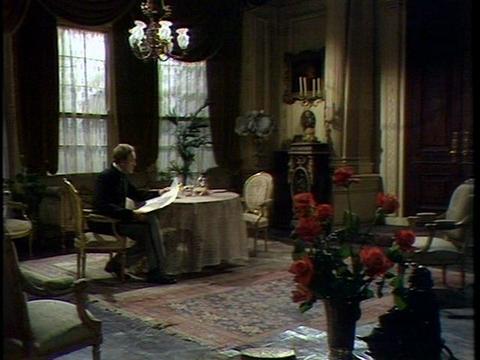
Pallisers Breakfast scene: the morning after
1 Establishing shot: we are in the Pallisers’ house in London, and the room where one can break one’s fast.
2 Wordless scene showing Lady Glen opening door suddenly, standing at threshold; she smiles and takes heart; Plantagenet (Philip Latham) stands and she shuts the doors behind her. They then stand apart for a moment:
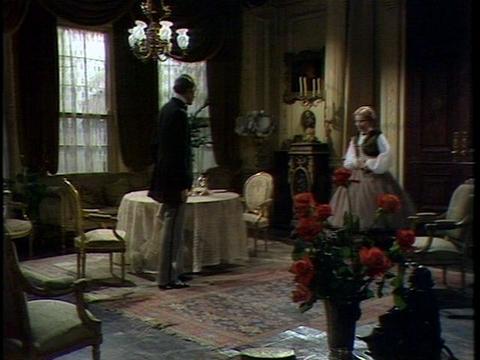
We hear horses’ hooves outside
She goes over to him and kisses him.
3 Conversation
Lady Glen: Good morning, Plantagenet. She holds a rose.
Plantagenet (kind tone): Good morning.
They go to sit down. A shot of him (from her viewpoint); he’s pretending to read. She watches him. He’s much better at pretending to go on with their usual routine than she is:
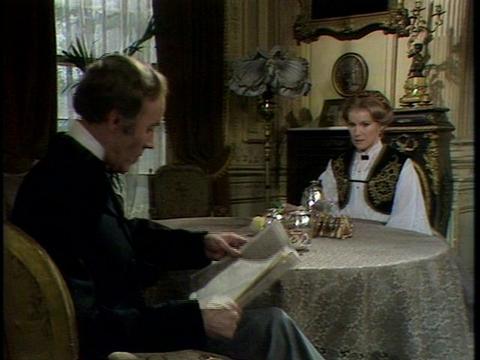
Lady Glen: You … you said last night that you had something to say about Lady Monk’s party.
Planagenet: Yes, my dear (folds and puts his paper away). After what happened last night, I feel I must say something.
Lady Glen: Yes. If you think anything Plantagenet, please say it.
Plantagenet: No, no, my fear is that you should suppose me to think more than I do. Now that’s the reason I decided to sleep on it before speaking to you.
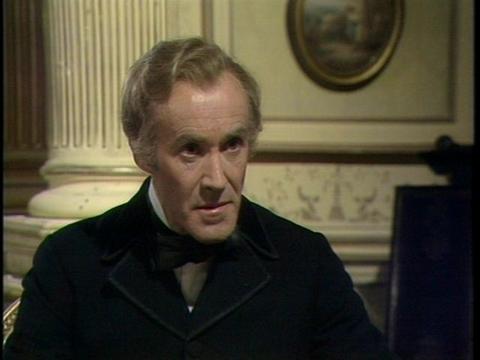
He is earnest, open, true.
Lady Glen: If anyone is angry with me, I would much sooner have it out whilst their anger is hot. I hate cold anger.
Plantagenet: I … I’m not angry.
Lady Glen (smiles): That’s what husbands always say when they’re going to scold (she smiles).
Plantagenet (becoming strongly in earnest): I… I’m not going to scold you. Now I’m simply going to advise you.
Lady Glen: Well, I would far sooner be scolded (smiles again).
Plantagenet (gets up suddenly, intensely anxious voice): Now Glendora, I require you to be serious with me.
Lady Glen: I am very serious.
Plantagenet: Well, you would do well to be serious. Now do you know why Mr Bott came down to fetch me from the Commons last night?
Lady Glen: Yes, yes, of course I do. Because I was waltzing with Burgo Fitzgerald.
Plantagenet (shakes his head): No, not simply because you were waltzing with Mr Fitzgerald.
Lady Glen. Well why then?
Plantagenet: It was because he saw that everyone was regarding you with wonder.
She looks unimpressed.
Plantagenet: And not only were you waltzing with Mr. Fitzgerald. You were waltzing with him … ah … how shall I say?
Lady Glen (an expression which seems to combine apparent amusement, triumph and being like a child): Upon my word, I can’t tell you.
Plantagenet: Recklessly.
Lady Glen: Oooh! recklessly. Was I reckless of what?
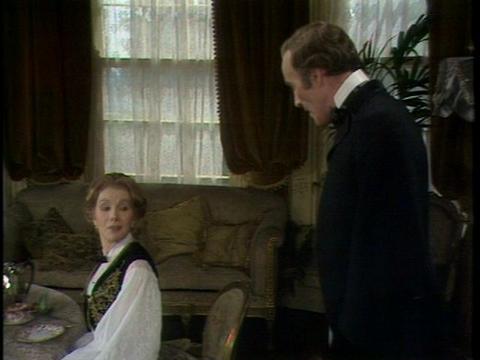
She carries her jocularity into a light sarcasm
Plantagenet: Reckless of what people might say. Reckless of what I your husband might feel (he quivers). Reckless of your own position (the anguished look on his face turns to anger at her pretense of frivolousness and trivialization)
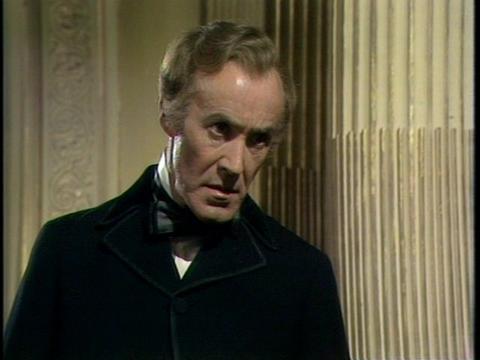
Lady Glen: According to Mr Bott, and of course you believed him.
Plantagenet: Oh, Glencora, do you really think that I would trust to Mr Bott’s truth rather than your own?
Lady Glen (whispers and looks up as to an ethical older adult one respects intensely): No, no, Plantagenet, I do not. Although you might have thought you had cause. I know I have never made you happy. I know I never can make you happy.
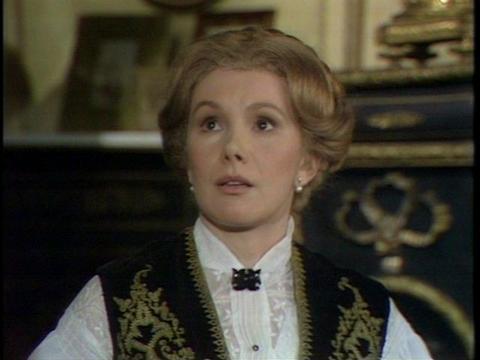
She is forced to acknowledge his uprightness; he will not go behind her back, not demean or insult them
Plantagenet: But I never complained … You never made me unhappy.
Lady Glen: But you have never loved me nor I you. We’ve never loved each other, not for a single moment. I was wrong to go to Lady Monk’s ball. I have been wrong in everything that I have done, but never so wrong as when I let them force me to be your wife.
Plantagenet (looks down): Oh, Glencora (a whisper).
Lady Glen: It is better than I should tell you everything. I do love Burgo Fitzgerald. I do (camera now on his face as he takes this in). I did warn you when we were engaged. How can I help it, I’ve loved him from the first before I ever saw you. And last night I almost made up my mind to tell him so and go away with him.
Plantagenet: You wanted to go with him? (In his face we see he had not expected this.)
Lady Glen: Well, would it not have been best for you? I do not love you as women love their husbands when they do love them, and say before God my first wish is to free you from this mistfortune I have brought on you.
Silent shot of him looking surprized and perturbed.
Plantagenet: By running away? (he gets up suddenly) and taking our honor as you run.
Lady Glen: Were it not for your hononr I’d have gone already, but honor apart what does it matter whether I drown myself or throw myself away by going with Burgo. If only you might be free from me, to marry again and have a child (she cries), the child I have failed to give you. Oh, I would die, Plantagenet, I’d die willingly if only you could be free to have the wife and child that you deserve.
Plantagenet (with great pity in his face): Oh! Cora! Cora you’re wrong in one thing. I do love you.
Lady Glen (shakes her head): No.
Plantagenet (speaking with difficulty): I’m … I’m not apt to say anything. My mind is running on other things.
Lady Glen (crying and turning to him): Your mind is running on other things.
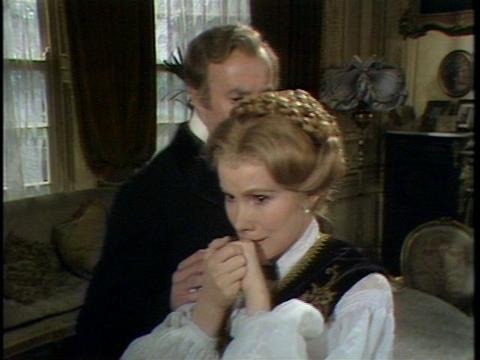
She is turned into a child: she cannot admit her sexual desires, and she is given nothing adult to do
Plantagenet: Ah, I do love you. And I pray that one day you may yet love me.
They hug in precisely the way we will see them come together later in the series when he loses the prime ministry, and he tells her he is hurt too but they must accept what has happened.
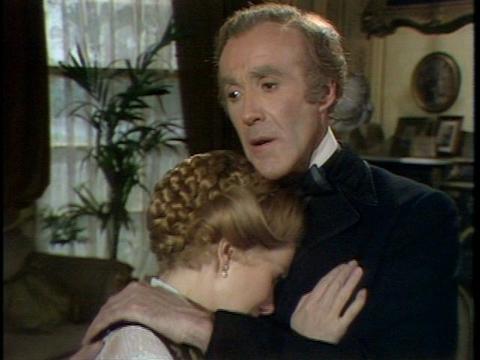
How touching are their hands, his delicate and hers thin.
************
“Read” sheerly through the stills, he comes off much better. He is never less than giving and loving, but then it is she who is to give up the life she wanted, the companionship she dreamed of having with another man.
But thought about in terms of social mores then and now: this is an extraordinarily frank but also idealized account. The nobility of Plantagenet is unreal or not likely; his lack of sexual anxiety, his lack of intense anger, jealousy, and possessiveness are all part of this ennobling portrait. His main emotion seems to be humiliation at what happened in public, fear of loss of public position, fear their reputation will be lost and they will be mocked, jeered at, despised. Lady Glen’s self-abnegation, her not saying that she doesn’t flee not so much for his honor but her own, and the very real danger she will end up (as George’s Jane does in the penultimate scene of this part, one I will transcribe and provide a picture from) destitute, shamed, a castaway, an exploited prostitute, probably in the end spurned by Burgo or dropped in his own despair. The Victorian way of speaking controls her and Alice Vavasour: they are both unworthy these wonderful men (I wondered last time if this is a way of speaking in order to get rid of a man by flattering him, to escape him).
Contextualizing against Trollope’s novel: Ch 58, “The Pallisers at Breakfast” in Trollope’s novel takes place many chapters after Lady Glen does not elope with Burgo Fitzgerald because Trollope deliberately puts other developments from the other stories first. In Trollope’s CYFH? at least as far as the plot-design and space of the book is concerned, the Palliser story remains the one which crops up intermittently as a remarkable parallel to the story of Alice, George, and Grey which carries the central story line of the novel; the third story is of Widow Greenow which probably takes as much space as the Palliser story and is a pastoral burlesque of the other two. In Trollop’s novel, the title, “Can You Forgive Her?”, refers as much to Lady Glen & the Widow Greenow as it does to Alice Vavasour.
In the 1974 BBC CYFH? (3:5), matter from “The Pallisers at Breakfast” (Ch 58 of CYFH?) becomes the first scene in 3:5, and does come directly after the last two scenes of 2:4, the ball scenes and then the non-elopement and scene where Burgo (Barry Justice) stands below Lady Glen’s (Susan Hampshire) window and silently urges her to flee.
So (as I’ve written), contextualizing by the film cycle, the Palliser story makes up the whole of the freely invented first episode of Raven’s film (1:1) and he makes the Palliser group part of the scene in Switzerland with George (Gary Watson), Alice (Caroline Mortimer), and Kate (Karin MacCarthy) (and brings Alice’s father, John Glyne Jones as John Vavasour, along too). For the Victorian middle class novelist who wanted his book to be carried by Mudie’s, for Trollope, it was verboten to show his couple in bed the night after she does not run away; indeed until very recently there was something of a taboo against showing married sexual love frankly; from the 18th through early 20th century married love was regarded as sancrosanct, something the author was required to leave out in order to idealize it; for Trollope also there is a limit to how far he is allowed to show a couple where the woman yearns to leave her husband to go live with her ex-lover and bethrothed, so he only lets them come on stage for limited amounts of time.
Henry James is probably right to suggest the strongest and deepest tragic material of the book is that of the Pallisers; it is the buried psychic stuff which is kept from sight, a dramatization of the price, the cost of social winning, great wealth, stability. Raven’s instinct was right to make the Palliser story central to a mini-series. A film is not a roman fleuve and it needs more than an intermittent story to keep the matter the viewer watches coherent and compelling.
I’ll be back tomorrow or Friday night with the second transcript.
Sylvia
P.S. Nick Hay pointed out how the decor and presentation of these two scenes coheres with what we find in Trollope’s text:
“There is an extraordinary contrast between Trollope’s Chapters 57 and 58. In the former we have the ‘wild beast’ tramping the hills and lanes, driven by the devil, now quite beyond the reach of all civilisation, in both a physical and metaphorical sense. I love the way Trollope throws in a personal recollection….
‘A man may be very weary in such a walk as that, and yet be by no means wretched. Tired, hungry, cold, wet, and nearly penniless, I have sat me down and slept among those mountain tracks—have slept because nature refused to allow longer wakefulness. But my heart has been as light as my purse, and there has been something in the air of the hills that made me buoyant and happy in the midst of my weariness. But George Vavasor was wretched as well as weary, and every step that he took, plodding throughthe mud, was a new misfortune to him.’
It emphasises George’s despair, isolation, madness. In addition,
the switch from this melodramatic, almost Gothic, landscape to the ‘civilised’ landscape of ‘The Pallisers at Breakfast’ which provides the clearest of contrasts. The pleasantness of the physical setting is emphasised…
“Exactly at half past eleven she entered the little breakfast parlour which looked out over the park. It was the prettiest room in the house, and now, at this springtide, when the town trees were putting out their earliest greens, and were fresh and bright almost as country trees, it might be hard to find a prettier chamber.”
E.M.
--
Posted by: Ellen
* * *
Comment
commenting closed for this article
